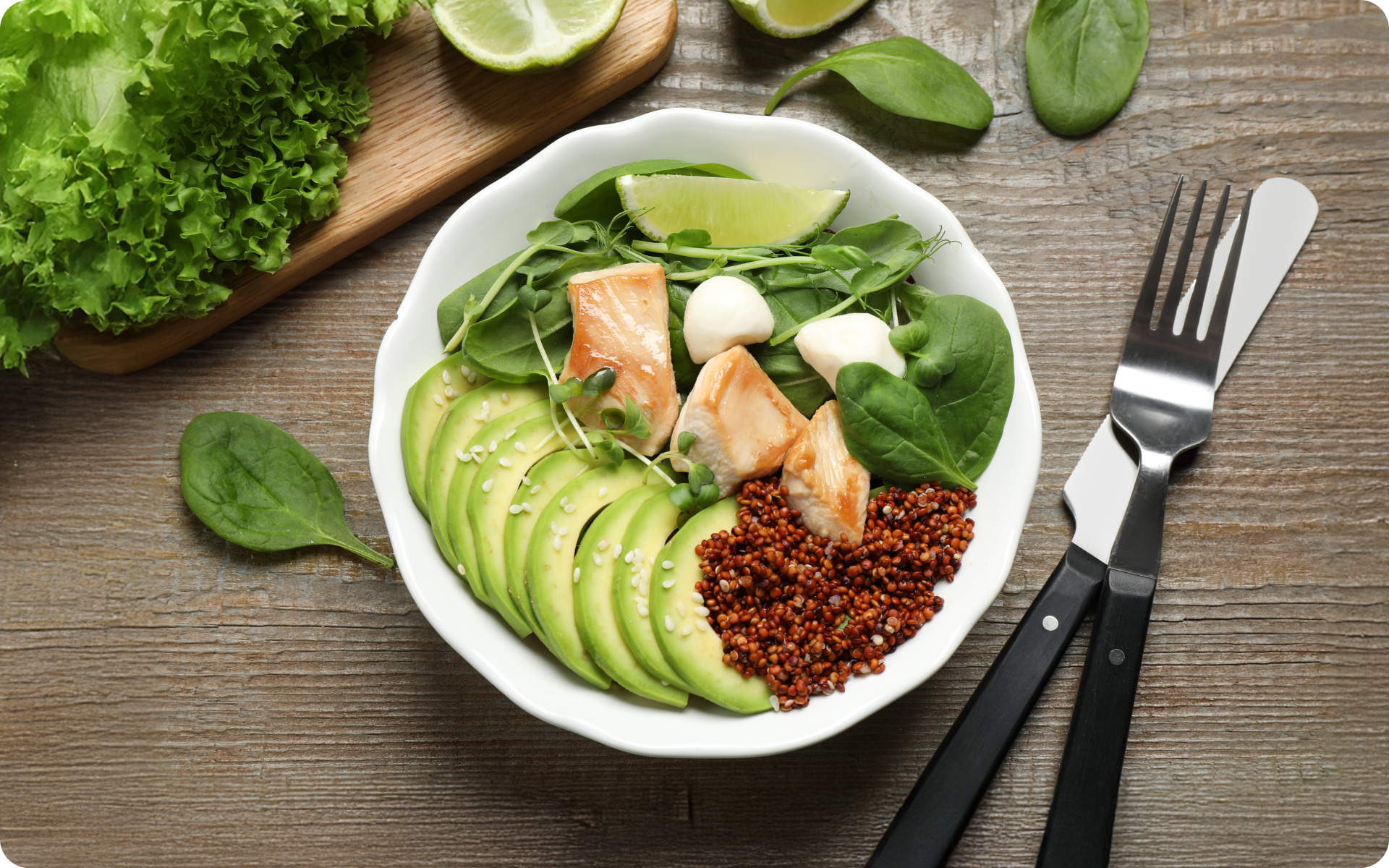Whether you want to promote healthy eating habits and lifestyle, save time and money, or reduce food waste, planning your meals is a strategy that can help you. It doesn’t matter whether you’re a beginner in this. You may have planned before and still don’t stick to your guide and that’s why these meal planning tips you’re about to learn may be a turn around.
Without a meal planning strategy, you may end up indulging in eating habits that aren’t aligned with your goals, spend more money, waste more food, stress about what to eat daily, or even miss out on some essential nutrients. Therefore, planning may be the way to go.
What Are Some Healthy Meal Planning Tips?
When it comes to meal planning, you need to be intentional about making it healthy. The food choices you include in your plan should be in line with your personal lifestyle goals. Here are some healthy meal planning tips for beginners. Of course, if you’re not a beginner, you can still use them to enhance your already existing plan. The tips include the following:
- Focusing on Whole Foods – for a healthy meal plan, prioritize eating minimally processed or unprocessed foods such as whole foods. Include fruits, vegetables, legumes, herbs and spices, nuts and seeds, and unprocessed meat and fish.
- Control Your Portions – controlling portion sizes will help you avoid eating excess calories, which is important for maintaining a healthy weight. Therefore, it’s helpful to use kitchen scales and measuring cups to make sure you’re eating enough and not too much.
- Maintain A Balanced Diet – it’s also important to ensure that your diet includes all essential nutrients such as complex carbohydrates, lean proteins, and healthy fats, among other nutrients.
- Limit Foods with Added Sugars and Sodium – the excessive consumption of added sugars and sodium has been linked to an increased risk of cardiovascular diseases (3). Therefore, to reduce the risk of cardiovascular diseases, obesity, and other chronic diseases, it’s important to reduce the consumption of foods with excessive added sugars and sodium.
- Maintain Good Hydration – water is crucial for many essential processes in the body. In fact, good hydration has been linked to a longer lifespan (1). Therefore, you should aim to drink enough water and include water-rich foods such as watermelon and other fruits and vegetables in your diet.
How to Plan Your Daily Meals
To plan your daily meals, you need to consider your nutritional goals or what you want to achieve. This includes the calories, protein, and other nutrients you want to focus on in your diet plan. Here’s how to make your plan:
- Plan Your Breakfast – your breakfast should be balanced, just like your other meals. Try to include protein-rich foods and other nutrients. Include foods such as whole-grain bread, eggs, Greek yogurt, fruits, protein powder, nuts and seeds, berries, smoothies, and vegetables.
- Plan Your Main Meals – include foods such as tofu, fish, beans, chicken, quinoa, brown rice, whole-wheat noodles, avocadoes, and colorful vegetables.
- Include Snacks – snacks are also important for meeting your nutritional goals. You can include morning or afternoon snacks or both, depending on your goals. Choose healthy options such as hummus and vegetables, nuts and seeds, and fruits.
Read more: 50 Grams of Protein a Day Meal Plan – Easy Guide for Healthy Living
What Are the Main Benefits of Meal Planning?
Meal planning is an important tool when it comes to planning your nutrition. Whether you want to reduce your weight, lower your blood sugar levels, or achieve any other health goal, it’s much easier when you have a plan to stick to. Therefore, this comes with a lot of benefits that include the following:
- Meeting Nutritional Goals
It’s easier to meet your daily nutritional goals when you have a plan. Without one, it may not be easy as you may rely on guesswork and even eat more or less than you need.
- Promotes Healthy Eating
It’s easier to maintain healthy eating habits when you have a meal plan. Studies have suggested that meal planning can promote healthy eating as it offers balanced nutrition, reduces the consumption of unhealthy or junk foods, and guides portion sizes (2).
Reasons why BetterMe is a safe bet: a wide range of calorie-blasting workouts, finger-licking recipes, 24/7 support, challenges that’ll keep you on your best game, and that just scratches the surface! Start using our app and watch the magic happen.
- Saving Time and Reducing Stress
When you have a plan, you know in advance what you’re going to eat for breakfast, lunch, and dinner, and what you’ll have as a morning or evening snack. Therefore, it reduces the stress of making daily decisions and saves a lot of time each day, particularly if you do some preparation beforehand.
- Decreases Food Waste
With a meal plan, you typically only prepare meals that are enough for your and/or your family’s needs. In addition, you only buy what you need and there will be less food going to waste.
What Are the 5 Basic Steps of Meal Planning?
Of course, meal planning starts with a first step. There are several steps that can serve as your guide when you make your own plan. This will help you work on your plan for the entire week. The steps include the following:
Decide What to Eat
Deciding what to eat should be the first step. You can create a plan that suits your personal needs and goals when you know what to eat. This should also be guided by breakfast, lunch, and dinner food choices, in addition to other meals and snacks. What you should eat is also dictated by your health goals, preferences, dietary needs, and what you have at hand.
Make A Grocery List
After you’ve decided what to eat, you should check your inventory and make a list of the ingredients you don’t have. This will guide you to create a detailed list of grocery items to buy.
Schedule Your Meals
Now you have everything in stock. What remains is to plan and schedule your meals. Assign specific foods to certain days and times of the week and ensure each meal is well-balanced.
When it comes to weight loss, progress is made by inches, not miles, so it’s much harder to track and a lot easier to give up. The BetterMe: Health Coaching app is your personal trainer, nutritionist, and support system all in one. Start using our app to stay on track and hold yourself accountable!
Prepare Your Ingredients
If you want to save time during the week, it’s important to prepare your ingredients for the next few days or possibly the entire week. Of course, preparing ingredients can take time as you’ll need to wash and chop fruits and vegetables, make dressings and sauces, cook beans and grains, and prepare tofu and meat, among other things. You should do this when you have some extra free time and it will save you time during the rest of the week. Our previous article covers everything you need to know about meal prep for weight loss.
Cook and Store
You can do some or all of the actual cooking if you want or if you won’t have time during the week to do so. After cooking your meals, you can store them in labeled containers in your refrigerator and/or freezer, depending on when you plan to eat them. This makes it easy to reheat and eat them during the week.
What Are Essential Meal Planning Tips for Beginners?
As a beginner, things may seem difficult at first, but you can simplify it all by starting small, setting realistic goals, and prioritizing simple recipes that are easy to make. Here are some of the tips for beginners:
- Start Small – if planning for the whole week seems like a huge task, start planning for 2-3 days instead. This will also help you know what works and what doesn’t before you commit to planning for the whole week.
- Set Realistic Goals – do you want to save money, eat and live a healthy lifestyle, or reduce stress? That’s a guide toward setting a goal for your meal plan. For example, if your goal is to live a healthy lifestyle, you’ll focus on healthy food choices in the right portions in your plan.
- Prioritize Simple Recipes – you need to start with recipes that are simple and easy to make. Of course, starting isn’t easy and you don’t want to make it complicated with difficult recipes.
- Repeat Favorites – there are some meals that you enjoy the most. You can rotate them in your meals throughout the week.
What Are Common Mistakes to Avoid in Meal Planning?
Some of the common meal planning mistakes include not planning before shopping, ignoring leftovers, not being realistic in your goals, overcomplicating recipes, not including variety, over-prepping, and forgetting to label and date your meals.
Meal planning saves money because you only buy what you need. Without a meal plan, you may buy things on impulse and end up spending a lot on some of the foods you wouldn’t have purchased if you’d had a plan. You may also end up wasting food. A 40/30/30 meal plan is an approach to ensure your calories come from diverse nutrient sources where 40% come from carbohydrates, 30% come from proteins, and 30% come from fats. It’s slightly lower than the acceptable macronutrient distribution range (AMDR) for carbohydrates, which is 45-65%, but falls within the ranges for protein and fat. Eating every 3 hours may be suitable for some individuals, particularly those who are trying to manage their blood sugar. However, it may not be favorable for some people, particularly those who are trying to manage or reduce their weight, although portion sizes also matter in these cases. Therefore, eating every 3 hours is dependent on individual needs and preferences. The 3-3-3 rule for weight loss is a strategy that tries to establish a structured eating approach or pattern that includes 3 balanced meals a day, at least 3 exercises per week, and drinking 3 bottles of water by 3pm. This approach is important for regulating hunger, maintaining a stable blood sugar level, weight management, and preventing overeating. Frequently Asked Questions
How can meal planning save money?
What is the 40/30/30 meal plan?
Should I eat every 3 hours?
What is the 3-3-3 rule for weight loss?
The Bottom Line
Meal planning comes with a lot of potential benefits, as we have discussed. It can help you eat healthily, avoid overeating or indulging in junk foods, save time, reduce stress, and also save money.
Therefore, whether you’re managing your weight, controlling your blood sugar levels, or just want to maintain overall good health, it can be helpful to have a meal plan. You can plan what to eat daily for breakfast, lunch, and dinner, and whether or not you need between-meal snacks. With this guide, you can easily draft a plan that suits your health goals, needs, and preferences.
DISCLAIMER:
This article is intended for general informational purposes only and does not serve to address individual circumstances. It is not a substitute for professional advice or help and should not be relied on for making any kind of decision-making. Any action taken as a direct or indirect result of the information in this article is entirely at your own risk and is your sole responsibility.
BetterMe, its content staff, and its medical advisors accept no responsibility for inaccuracies, errors, misstatements, inconsistencies, or omissions and specifically disclaim any liability, loss or risk, personal, professional or otherwise, which may be incurred as a consequence, directly or indirectly, of the use and/or application of any content.
You should always seek the advice of your physician or other qualified health provider with any questions you may have regarding a medical condition or your specific situation. Never disregard professional medical advice or delay seeking it because of BetterMe content. If you suspect or think you may have a medical emergency, call your doctor.
SOURCES:
- Good Hydration Linked with Longevity (2023, nhlbi.nih.gov).
- Meal Planning as A Strategy to Support Healthy Eating (2020, researchgate.com)
- Relationship between dietary sodium and sugar intake: A cross‐sectional study of the National Health and Nutrition Examination Survey (2020, pmc.ncbi.nlm.nih.gov)











